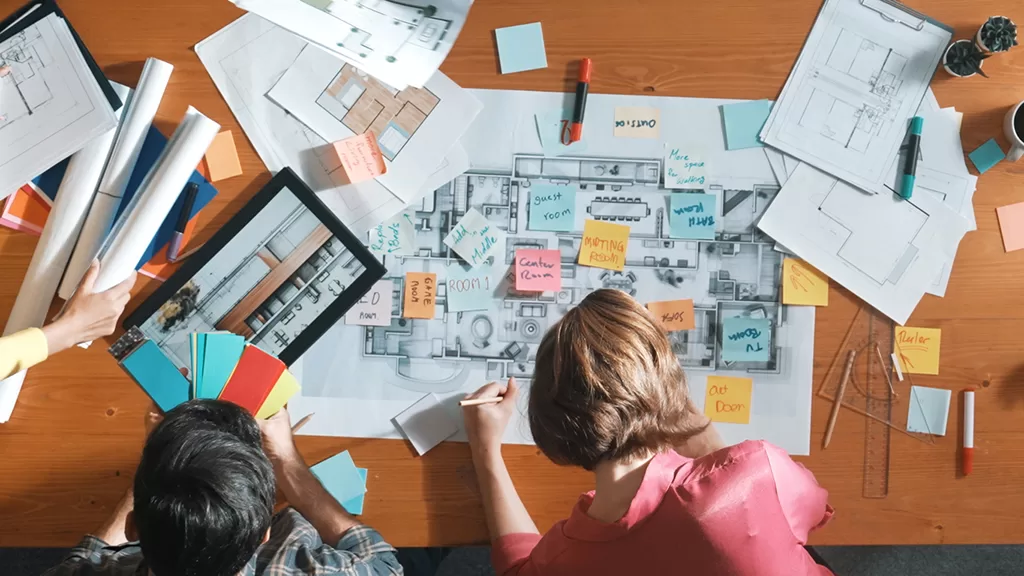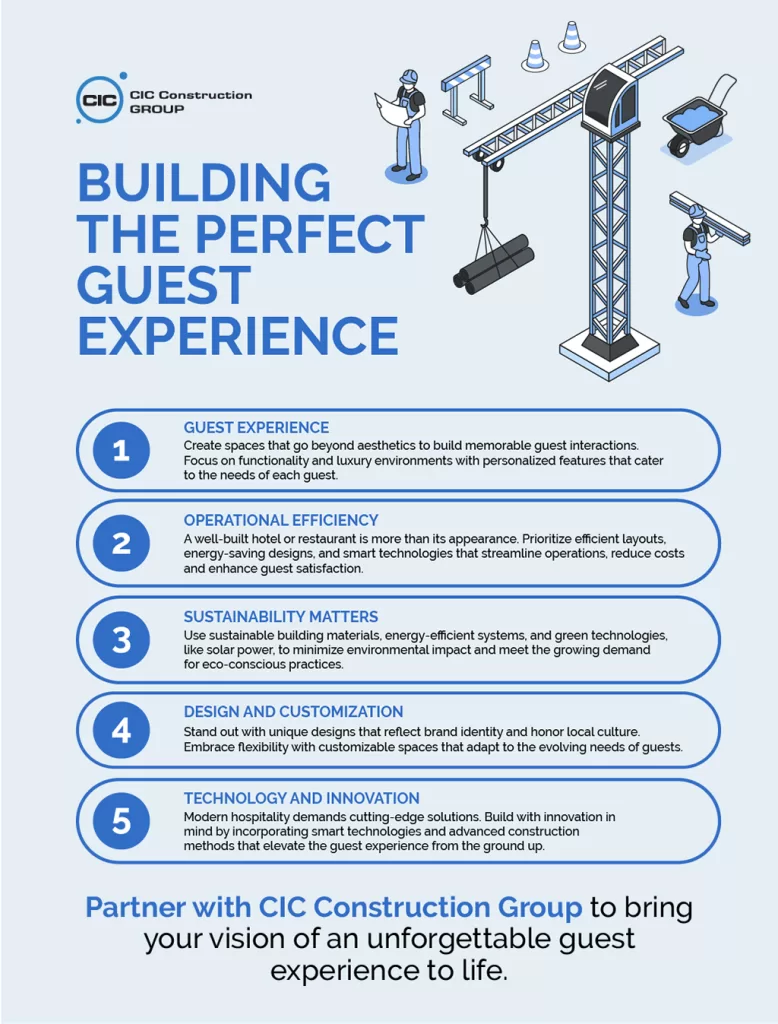



In the modern era of travel, hospitality construction has become a specialized field, uniquely positioned at the intersection of architecture, guest experience and operational management. Building a hotel, resort, or restaurant requires more than just walls and foundations; it involves designing spaces that provide memorable guest experiences, efficient operations and a commitment to sustainability.
Construction in the hospitality industry demands the expertise to meet complex demands, from aesthetic design to innovative technological integrations. The aim is to ensure that every element of the building enhances the guest experience, all while reducing environmental impacts and maximizing operational efficiency.
Hospitality construction refers to the design, planning and building of structures specifically intended to serve the hospitality industry. These structures can include hotels, resorts, restaurants and other spaces dedicated to offering a welcoming, comfortable and enjoyable experience to guests. Unlike conventional construction projects, hospitality construction has to prioritize the needs of guests while also considering the business’s operational requirements, often balancing comfort, aesthetics and sustainability.
The hospitality industry is all about creating spaces that feel luxurious yet efficient, modern yet timeless. Every decision, from the materials used to the layout of rooms, affects how guests interact with the space and perceive the brand. For developers and architects, the challenge is to merge the guest’s desires with practical considerations, ensuring both an exceptional experience and operational viability.
At the heart of every hospitality project is the guest experience. Guests today expect more than just a place to stay or dine; they seek an experience. From the ambiance in the lobby to the comfort of their rooms or the atmosphere in a dining area, every detail of the design plays a role in shaping that experience.
A hotel room, for instance, must offer both luxury and functionality, balancing cozy aesthetics with practical elements such as ample storage space, convenient power outlets and high-quality bedding. Public spaces like lobbies, restaurants and lounges must provide a seamless transition between relaxation and social interaction, catering to various guest needs at different times of the day.
The design also should be customizable. In recent years, there’s been a trend toward offering personalized experiences that involve flexible layouts, varied lighting settings and adaptive room controls that respond to individual guest preferences.
Visit the 12 Qualities That Set Top Construction Companies Apart
Behind the scenes, hospitality structures must run like well-oiled machines. A beautiful hotel that is difficult to operate or maintain will quickly become a drain on resources. Operational efficiency in hospitality construction involves designing buildings with layouts that ease the workflow for staff, maximize space usage, and reduce energy consumption.
For instance, efficient floor plans ensure that hotel staff can quickly navigate between guest rooms, housekeeping closets and supply areas, reducing the time and effort required for daily operations. In restaurants, kitchen designs must facilitate a smooth flow of food preparation, while ensuring that staff have easy access to tools, ingredients and service areas.
Operational efficiency also extends to the integration of technology. Automated check-in processes, smart thermostats, and energy management systems streamline operations while enhancing the guest experience. The more efficiently the building operates, the lower the operational costs, allowing hospitality businesses to offer competitive prices without compromising on service quality.
Read also: Efficient Project Scheduling Is a Must in Construction Management
Sustainability has become a core consideration in hospitality construction. Modern guests are increasingly eco-conscious, expecting businesses to reduce their environmental footprint. For this reason, construction projects are now incorporating sustainable materials, energy-efficient designs, and green technologies into their blueprints.
LEED (Leadership in Energy and Environmental Design) certifications and other green building standards are becoming common in hospitality construction. Buildings are designed to minimize energy consumption by utilizing energy-efficient windows, insulation and lighting. Water-saving technologies, such as low-flow faucets and smart irrigation systems, also help reduce waste.


Additionally, the use of sustainable building materials—such as recycled steel, reclaimed wood and locally sourced materials—supports environmental goals and local economies. The integration of renewable energy sources, such as solar panels and geothermal systems, further underscores the hospitality industry’s commitment to a sustainable future.
Read also: Top benefits of solar energy for commercial buildings 2025
In hospitality, design is not merely about aesthetics but also about creating spaces that are functional, welcoming and memorable. Guests today crave uniqueness and personalization, making customization an essential part of hospitality construction.
Hotels and resorts are moving away from cookie-cutter designs, opting for spaces that reflect the local culture or the brand’s identity. This can be seen in everything from the choice of décor to the architecture itself. In some cases, hospitality projects incorporate regional materials and design elements that provide guests with an immersive experience connected to the destination.
Customization also involves flexibility in room layouts and public spaces. Modular construction techniques allow for adaptable layouts, while furniture and interior design choices often provide multiple configurations to suit different guest needs. For example, a single room may serve as a business suite during the day and a family room by night, depending on the furnishings and features selected.
Technology and innovation are helping to create more efficient, sustainable, and personalized guest experiences. Smart hotels are becoming more common, offering guests everything from keyless entry to voice-controlled room settings. This level of technological integration starts in the construction phase, with designers and builders working to ensure that the infrastructure can support these advanced systems.
In addition, construction technologies such as 3D printing and prefabrication are making it easier to construct buildings faster and more sustainably. These innovations reduce waste, speed up the construction timeline, and allow for greater precision in the building process.
The construction of hospitality spaces is an intricate balancing act between creating comfortable, elegant and memorable guest experiences while ensuring operational efficiency and committing to sustainability. As technology and innovation continue to evolve, we will see an increased focus on customization, eco-friendly design, and guest-centric technology.
If you’re looking to create a world-class hospitality space, consider partnering with CIC Construction Group. Our extensive experience in hospitality construction equips us to understand the unique demands of the industry and deliver exceptional results. Contact us.

